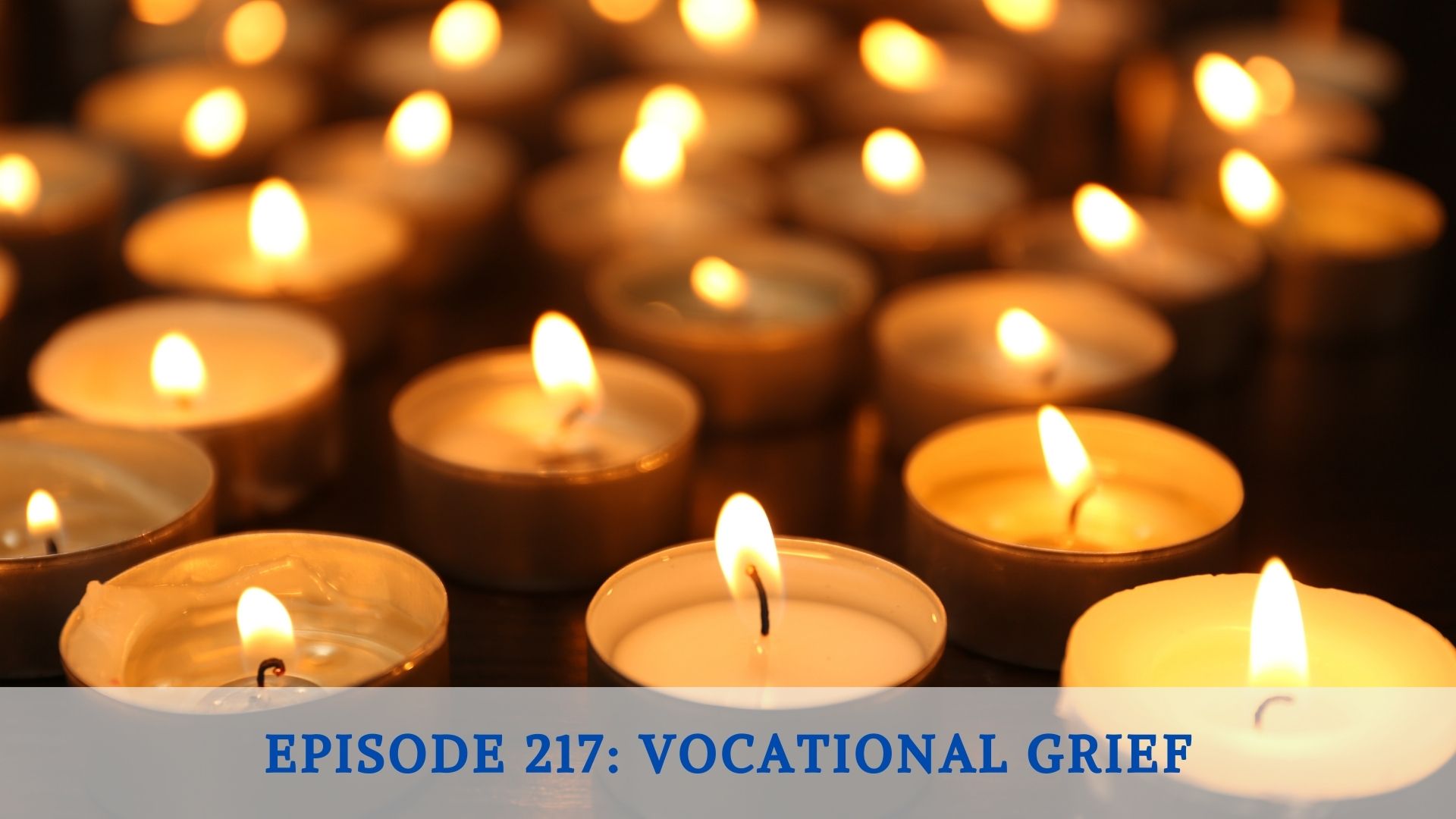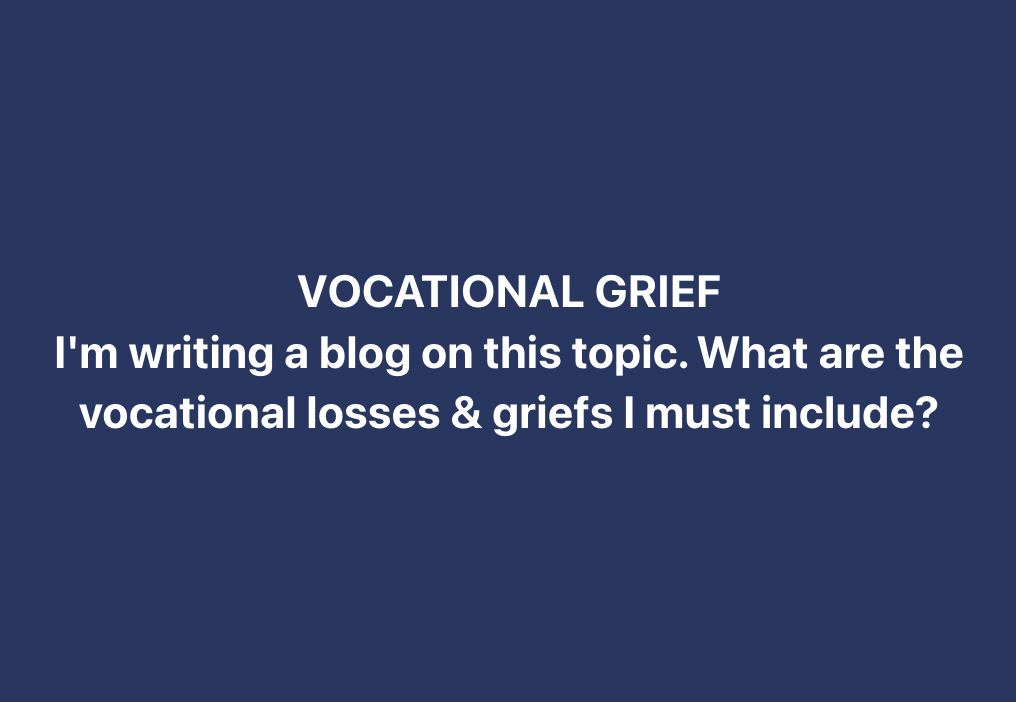Gratitude is rightly our focus during clergy appreciation month, yet as part of our acknowledgement of clergy today, let’s also attend to the reality of vocational grief. While it can be hard to name and process, and typically remains out of sight, still many pastors and ministers carry vocational grief that is multi-layered, emotionally weighty, and intensified by the last three years.
What is vocational grief?
Several years ago, I was in a difficult season vocationally. My full-time, grant-funded, academic position was ending. I put in applications for the few open positions in my field. I became a finalist for several seminary teaching jobs. Schools invited me for campus interviews and job talks. However, each job presented its own reasons for not being the right fit. These specific losses, a general scarcity of jobs in theological education, and years of being under-employed was wearing me down.
One day in that season following worship at my Nashville church, I chatted with another theological educator, Dr. Melissa Snarr. As I briefly shared with her my frustrations about the losses and longing to identify my next vocational landing place, I found myself on the brink of tears.
In that moment, Melissa named and acknowledged my vocational grief.
It was a relief to have a name for losses that have hounded me for most of my adult life. You don’t come to a vocation to ministry as a woman without some measure of loss and grief. Even if the path into the work is easy, most women eventually find the brick walls and the guardians of the gates of access and equity. These losses are real. In that moment, theological education was feeling much the same for me.
Yet gender is far from the only source of vocational grief.
Loss and Grief in Ministry Related Vocations
There are so many kinds of loss one can feel in relationship to vocation. I shared some of that grief from the ending of my full-time ministry recently. It came in the form of losses the church was feeling. Yet unbeknownst to them, or me, they enacted their grief in mis-placed conflict. The conflict became focused on me. This happens often to ministers and church leaders. And although dynamics like the ones I lived through hurt enormously, they are hard to name and harder to process.
Earlier this week I wrote more of my personal story of vocational grief related to teaching in theological education. I wanted to check in with ministers and professors who might also know something of this grief.
I posted this question on my Facebook page:
Within the first couple of hours, I felt overwhelmed by the responses, conversation, and sheer magnitude of the losses. I went to a late-night movie and didn’t check my feed again until Sunday morning. Then I woke to an avalanche of vocational losses and griefs.
I cannot begin to name all those losses right here. But I want to acknowledge that they take many forms. Ministers carry so much loss. It is part of caring for people, walking through the griefs of parishioners. But vocational grief emerges from tragedies like untimely and unjust deaths of children of the church, from both institutionalized and personal sexism, racism and injustices that prevent meaningful employment, from relational betrayals and disappointments, from abuse, underpayment, unfair restrictions, and hurtful dismissals. The list is long and heartbreaking.
Surprisingly, however, as we named and acknowledged vocational griefs together, I was not simply overwhelmed. I also felt space opening for more of my own grief to be seen, acknowledged, and normalized. I was not exactly expecting that.
Sunday night
The most important thing to do this evening is to acknowledge you, dear minister, and your vocational grief. I am saying that it’s not just enough to thank clergy for all they do and say and live and give. If we really want to appreciate them, then we also would do well to acknowledge the deep and often hidden costs and losses related to their work.
And to everyone reading this, I want to encourage you to honor your vocational grief. Whatever your calling in life is – teaching, parenting, ministry, farming, praying, creating art, sports, healthcare, social work, politics, writing, singing, building, shipping, repairing, cooking – there are losses and hidden demands that people beyond your world do not know about. It is real and you can talk about it. I hope you will consider ways to acknowledge and honor your griefs.
Ministers, I especially see you. So much of the work you do remains hidden to even the people you serve. And you carry the losses and griefs of the people you lead. You also carry your own vocational grief.
My vocation includes the work of articulation. That means I try to put words around the experiences that ministers, pastors, chaplains, students, and theological educators have in their vocational lives. Many common experiences don’t have names or easy ways to talk about them. Thus, with questions, some new language, and stories, I aim to make these experiences more visible.
Three words on loss and grief
Here are three words for your vocational grief. I put them in the form of questions so you might receive them as encouragement and hope, rather than advice or rules. Then I invite you to join me for a free event on All Saints’ Day. We will take time to acknowledge and honor our vocation grief. Sign up form is below.
1) How can we acknowledge our losses and griefs?
Sunday night I went to hot yoga and I skipped one whole series by lying on the floor in child’s pose, crying for my grief and yours. Release of emotion through acknowledgement is so important. Release through naming your losses and griefs to someone who listens with care, is another powerful way to acknowledge your experience. Maybe music helps? Maybe a physical release through running, yoga, sports, or singing brings release? Your body knows the language of grief. Let it speak. Use words when helpful.
2) How can we honor our losses and griefs?
Vocational losses are often ambiguous rather than concrete. We feel them yet we go on with our work. Psychologist Pauline Boss recommends that we work with our ambiguous losses by focusing on meaning rather than closure.
What helps? Letting go of the idea of closure and instead, finding meaning in our losses; thinking both/and about the positive and negative; increasing our tolerance for ambiguity; and finally, risking change by doing something different.
~Pauline Boss, The Myth of Closure
Yet as people called to serve God, we know that meaning is not always obvious, clear, or perhaps even necessary. With grief, to impose meaning too soon can feel glib and unhelpful.
Rather that leap to meaning making prematurely, I believe honoring our grief by letting it have its place in our lives gives its own inherent meaning: This happened. I lost something or someone I loved, and now that loss is part of my life. I will give it a place in my life without denying it or ignoring it. And I trust with time I may understand more.
3) How might we weave loss and grief into our vocations?
Rather than deny or suppress your vocational losses, we start by allowing them their due. Acknowledge and name them. Speak or write them in ways and with people who will help you receive and honor the losses. In a culture that denies death and demands closure, this is not intuitive work. Yet by taking these simple yet profound moves, we make a way for the losses and griefs to live alongside the loves and joys of our vocation.
When I was pressured until I resigned from my first church job, many of my friends worried that I and my vocation might break. But neither broke. I lost a job, not my calling to ministry. And it turned out when I had time to imagine that calling without the job, I found something much deeper. It had been there all along, but only the loss revealed its presence more fully to me.
I felt a call to ministry, yes. But in fact there was a deeper sense of calling about what kind of life I wanted to live and two years of searching for a ministry job, five and a half years in that call, and the abrupt end to congregational ministry all led me to a deeper realization of a major vocational purpose in my life: being with people in a particular way and making space, creating conditions to see and be seen in a genuine way, this is the deeper life purpose that was emerging.
Episode 24: Vocational Discernment
Even in the very best of circumstances for ministry, theological education, or any of the hundreds of callings people live, loss is part of the equation. Recognizing vocational loss when you see it or experience it, is a good start. Acknowledging and then honoring the loss and all its many feelings, may keep it from operating unnamed in the shadows of your vocation and work. There it can drain away your life. But in the light of Christ, seen and heard, it may with time become one more dimension of a complex calling.
This event has now passed. You can watch a brief video (15 min) at this link.





